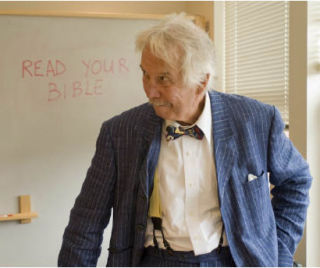At the close of “Inherit the Wind,” the character Henry Drummond picks up a Bible and a biology textbook, slaps them together, and puts them in his briefcase before exiting.
“It’s a wonderful visual metaphor for what the play is trying to say,” Kate Carruthers said.
Helming Island Theatre’s production of the 1955 play, which opens tomorrow for a 10-show run at Kitsap Regional Library branches, has been an eye-opener for the veteran theater director.
Because despite the pulpy messaging in the promotional poster for the 1960 film version – “It’s all about the fabulous Monkey Trial that rocked America!” – Carruthers came away with a new appreciation for the play’s subtlety.
She discovered that in fact, when regarding the two ends of the political-religious spectrum, there’s ample room for shades of gray.
“The play is fabulous at acknowledging the place of religion in society,” she said. “What it’s critical of is people who succumb to fear and reject new ideas simply because they’re afraid of change.
“But it’s something more than that, something different. We’re afraid of people who are different, ideas that are different. And evolution is about growth and change.”
“Inherit the Wind,” penned by Jerome Lawrence and Robert E. Lee, dramatizes the 1925 Scopes Monkey trial, in which a young high school teacher was called to task for teaching Charles Darwin’s theory of evolution.
Scopes taught from the biology textbook prescribed by the state of Tennessee, but meanwhile, the Butler Act made it illegal in that same state to teach any theory of human origin other than creationism.
Aided by the American Civil Liberties Union and nationally known attorney Clarence Darrow, Scopes went on trial. The prosecution was led by former Secretary of State William Jennings Bryan, and the events were documented by The Baltimore Sun’s H. L. Mencken among other journalists.
In real life, Scopes never took the stand; the courtroom drama occurred in the eventual standoff between Darrow and Bryan, who became the characters Henry Drummond and Matthew Harrison Brady.
The conflict is heightened by the townspeople of fictional Hillsboro, Tenn., a pious collective representing a community resolutely afraid of change. The Mencken character, E. K. Hornbeck, offers a cynical counterpoint that constantly calls out the community’s backwoods ignorance.
And what Carruthers appreciates about the play – something that’s perhaps easy to overlook if one views the plot through Hornbeck’s lens – is that despite their philosophical and religious differences, both Drummond and Brady possess enough intellectual capacity to allow for, even insist on, wiggle room. Fundamentally, no pun intended, people should believe what they want to believe.
For instance, when Hornbeck’s cynical rants and asides become too much, it’s none other than the agnostic Drummond who puts him in his place.
And when the town preacher goes over the top at a revival meeting and calls down hellfire on his own daughter, it’s not Drummond who stops him but Brady, invoking Proverbs:
He that troubleth his own house shall inherit the wind:
and the fool shall be servant to the wise of heart.
“This play has caused me to think about this stuff,” said Carruthers, who was raised in a Catholic household but isn’t a practicing Catholic now. “I think it’s easy to see religion – and a lot of times I think liberals do see religion – as a bunch of superstition and myths, that it is the refuge of the weak and the fearful and bigoted and closed-minded…and while it can be, I think that’s the small way of seeing it.
“I don’t think that science and religion are incompatible. I don’t think it needs to be ‘either-or.’ And in the end, I think that’s what the play comes down on.”
Carruthers does view the play as directly relevant today; after all, the evolution-creationism debate hasn’t gone away. In 2005, a Pennsylvania school district mandated the teaching of “intelligent design,” a modern version of creationism. A parent group sued, and a federal judge ruled against the district. More recently, vice presidential candidate Sarah Palin has spoken in favor of teaching intelligent design in public schools.
As a Bainbridge Island Municipal Court judge herself, the director won’t delve too deeply into matters political. But she will go so far as to second Drummond’s notion that whatever God who created us most certainly built in an ability to adapt and change.
“To deny evolution is to deny our ability to grow up and learn anything, to progress as a society…and that’s to deny hope for mankind,” she said.
In the end, Scopes was found guilty. But his punishment was a nominal $100 fine, a fact that cements Carruthers’ belief in the importance of the role of the court in society. While the play isn’t necessarily realistic, “it is true in its essence…and it does really effectively dramatize how important our courts are to protecting our civil liberties and our constitutional rights. It’s kind of exciting to be a part of that, to see how courts influence what happens.”
Heightened action doesn’t hurt, especially after a morning on the bench.
“This is more fun than any courtroom I’ve ever been in,” she said. “Because this is theater.”



